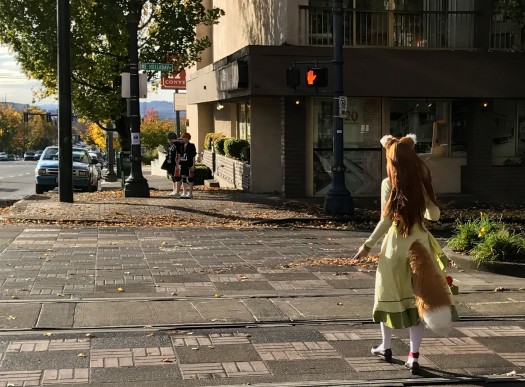A Placemaking Journal
Loneliness, Isolation, and Dementia: Walking down our odds of disconnection
 In this week after the most contentious U.S. presidential election of my lifetime, millions of us are feeling lonely, regardless of which way we cast our vote. Loneliness is not the result of being alone, but rather the feeling of being disconnected. Now more than ever, all that connects us to common ground – and to the neighborhoods we call home – is essential and deserves nurturing. Loneliness is more prevalent than depression, but we don’t understand it as well because we are generally not as willing to talk about it.
In this week after the most contentious U.S. presidential election of my lifetime, millions of us are feeling lonely, regardless of which way we cast our vote. Loneliness is not the result of being alone, but rather the feeling of being disconnected. Now more than ever, all that connects us to common ground – and to the neighborhoods we call home – is essential and deserves nurturing. Loneliness is more prevalent than depression, but we don’t understand it as well because we are generally not as willing to talk about it.
Loneliness and Connections
This autumn, I’ve enjoyed being on the speaking circuit, visiting Denver, Cleveland, Montreal, and Portland, with Surrey and Edmonton coming up soon. In Portland, the topic of my keynote was loneliness, with over 700 Oregon and Washington APA planners. We are at a challenging point in time, with anti-government, anti-planning attitudes running deep. It’s worth taking a moment to reflect on ideas that may reconnect us in some way.
Our work seeks to complete and activate monocultures and diversify the suburban landscape that promotes isolation. I’ve blogged before that loneliness is as dangerous as smoking or obesity, and more dangerous than inactivity, increasing blood pressure and sleep disorders (PLOS Medicine, 2010). A sense of isolation disrupts our thinking abilities, will power, and immune systems (Cacioppo, 2009).
All images below can be clicked for a larger view, and are CreativeCommons ShareAlike Licensing, with attribution to Hazel Borys.
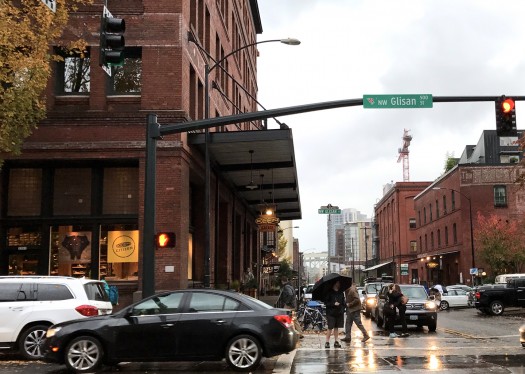
The Pearl District in Portland is an activated place, nurturing social, economic, and environmental health – where two friends are likely to share a rainy hug in the crosswalk.
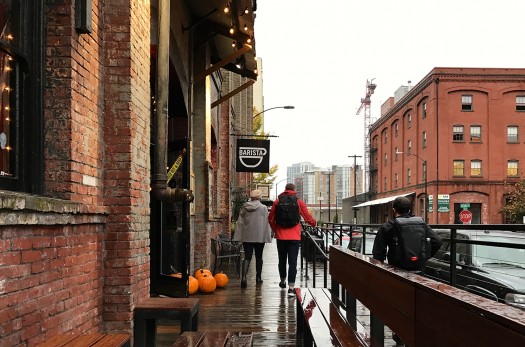
As Steve Mouzon would say, a gift to the street is when the private realm provides something useful, interesting, or restful to the public realm. It’s tough to find a café in Portland that doesn’t provide seating on the sidewalk. Places that are still regulating against such gifts may want to reconsider.
Connected places are the ones rich in social networks, which – interestingly – build neural networks. It isn’t too much of a stretch to say that the more street connections your neighborhood has, the more neural connections you are likely to have. A couple of fields of science – neuroplasticity and epigenetics – intone that the more time we spend in connected places, the higher our likelihood of wellness.
Neuroplasticity shows neurons that fire together wire together. The more I think a thought – be it healthy or destructive – the easier it is for me to think that thought again. Which leads to habits and behavioral choices like active transportation. I only intended to give up my car for the first summer that I moved to Winnipeg, but slipped into the habit of cycling and taking the bus. Eight years later, we are still a one-car family. Thanks, neuroplasticity.
Epigenetics points out that we have a sort of volume control on our DNA, and lifestyle choices can increase or decrease our odds of our genetic markers becoming our reality. 70% of our genes that code for health are under our control, depending on our lifestyle choices. Since my mom suffered from dementia, I have an extra interest in neuroplasticity and epigenetics, trying to put the pieces together for aging in community. Walking 30 minutes every day reduces the risk of dementia by 50%, along with a host of other maladies.
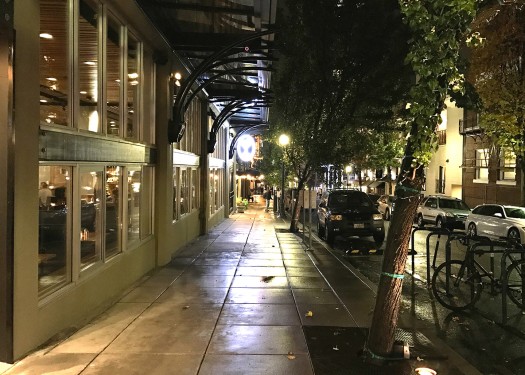
Vehicle Miles Travelled (VMT) peaked in Portland in 1996, which is one reason that Portland is among the top three US cities with least car-related deaths, along with New York and San Francisco.
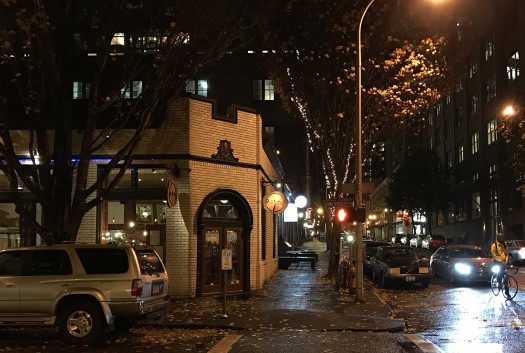
More people cycle to work here than in any other US city – over 7%. It’s not surprising that Open Streets started in Portland.
Dual Fuel: Grain Brain and Car Brain
Just as relying on carbon-based fuels for our personal transportation needs reduces brain health, so does our failure to recognize that our bodies run on dual fuel: glucose and ketones. We manufacture glucose from carbs and ketones from fats. The demonization of fat started about the same time as our love affair with the automobile, seeing precipitous increases in both dementia and diabetes.
We substituted high-fat diets with an overindulgence in grain and sugar, and the ensuing inflammatory response has been crippling. Alzheimer’s and arthritis are two primary unintended consequences, representing the effects of inflammation on the brain and joints. Alzheimer’s is being called “Type 3 Diabetes” by some, as we become insulin resistant and unable to process glucose. My favorite references on this topic are Dr. David Perlmutter, Dr. Dominic P. D’Agostino, and Dr. David Ludwig.
Driving around in our cars munching on Little Debbie’s has created a sort of perfect storm in public health.
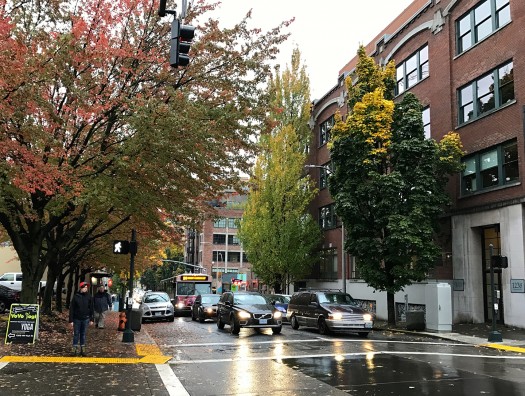
Because of transit, average Portlander has an extra $4,000 of disposable income every year. Effective urban standards gives 68% return to Portland Streetcar (compare: Houston’s Discovery Green 6.7%).
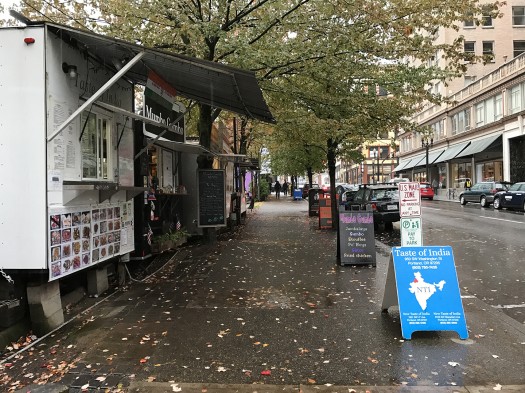
Mumbo Gumbo can help increase your fat content, and was rated the best gumbo in Portland, according to FourSquare. I can affirm that! Although as full disclosure, my two nephews run the place, along with Steak Your Claim.
Come Together: Connected Places
The flip side to lonely places are walkable, connected places that tend to contribute to happiness (The Happy City, 2015). Urban form exerts a dramatic impact on the manner in which a city is used, combatting disease-related stress (Ellard, 2015).
Integrating nature into walkable urban places (WalkUPs) only increases our odds of wellness.
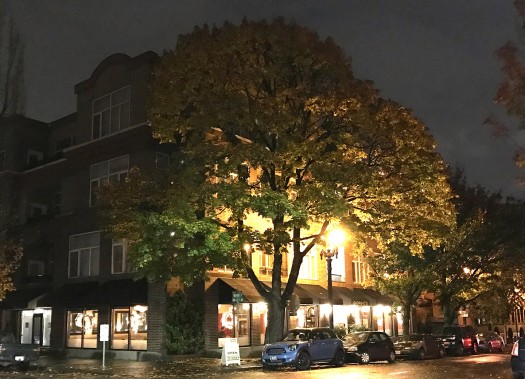
Often local regulations cite repair and maintenance issues related to street trees as a reason to maintain barren sidewalks.
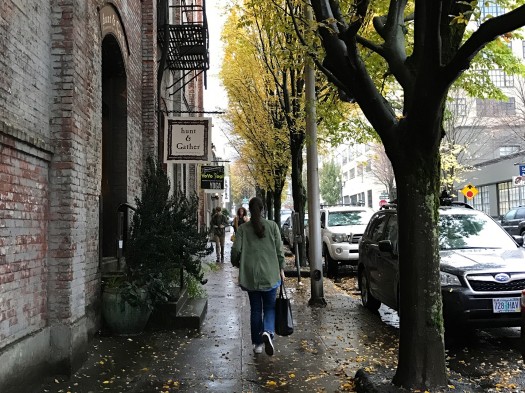
Places that take into account the return on investment of integrating nature into urbanism reap both economic and social benefits.
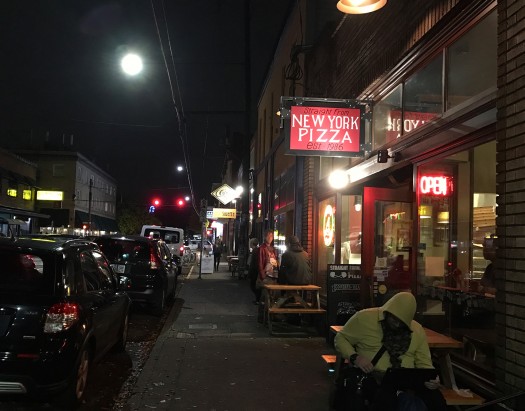
The corridors in Portland without the wealth of street trees still provide a more comfortable pedestrian realm.
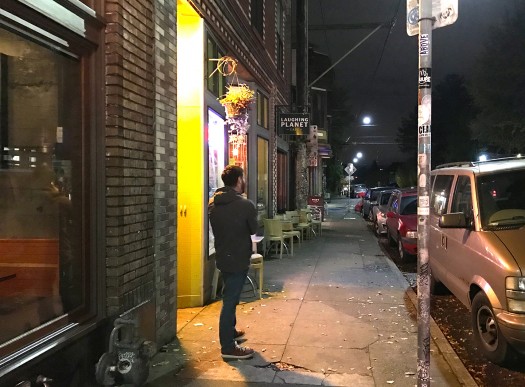
The buffer of on-street parking makes walking feel less dangerous, while enjoying the gifts to the street of outdoor café seating.
As I walked the streets of Portland, the diversity and the connectivity were the most enjoyable parts of the experience. During this week of massive global change and reorientation, I’m seeking to find the connections with people who are rather diverse. Who knows, maybe if I keep looking, I might just find a fox.
If PlaceShakers is our soapbox, our Facebook page is where we step down, grab a drink and enjoy a little conversation. Looking for a heads-up on the latest community-building news and perspective from around the web? Click through and “Like” us and we’ll keep you in the loop.


